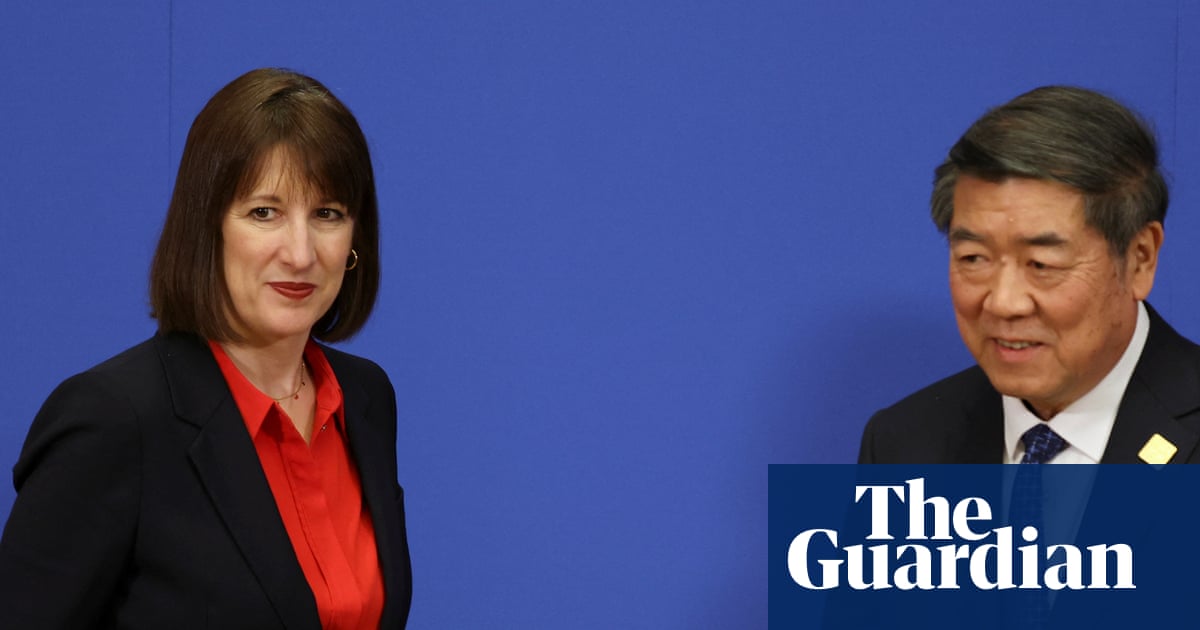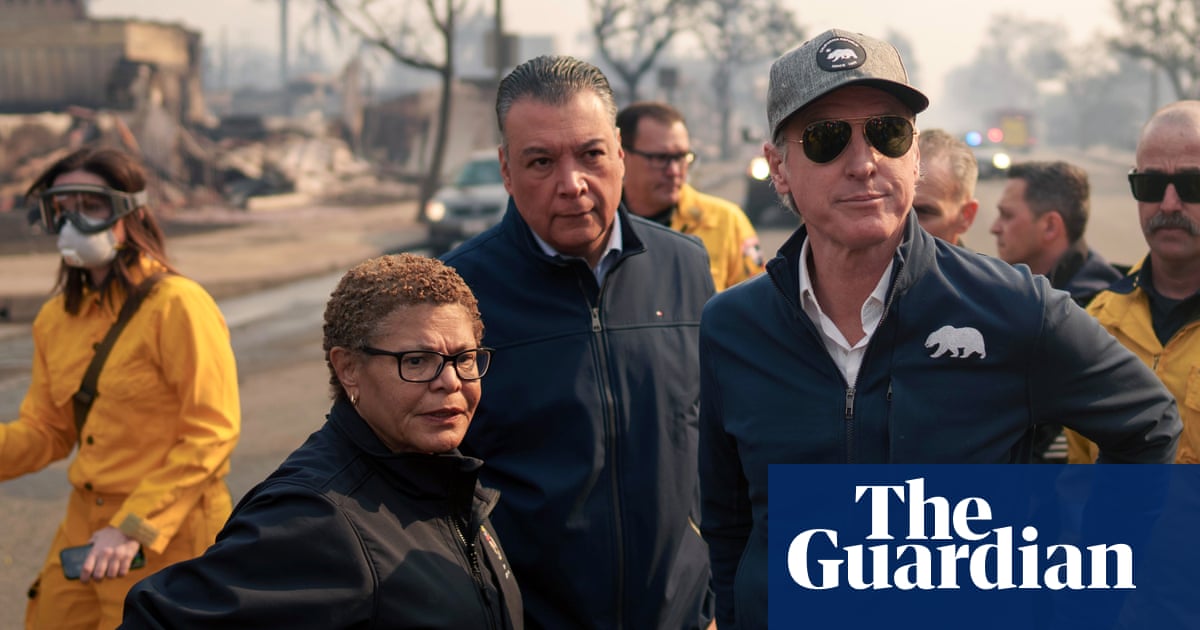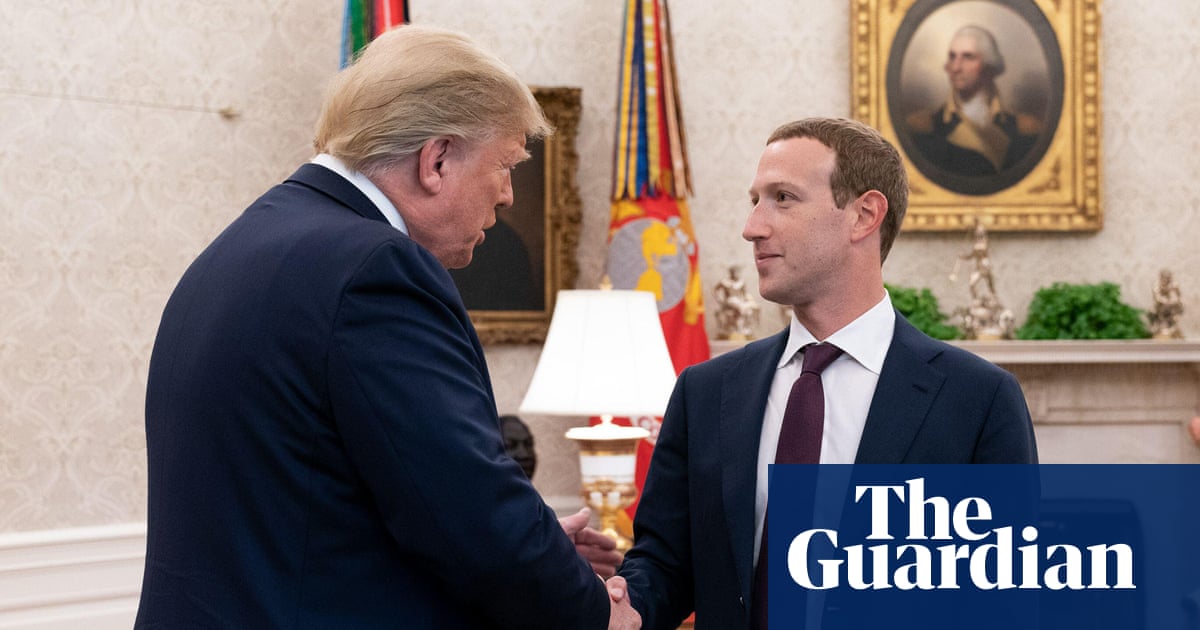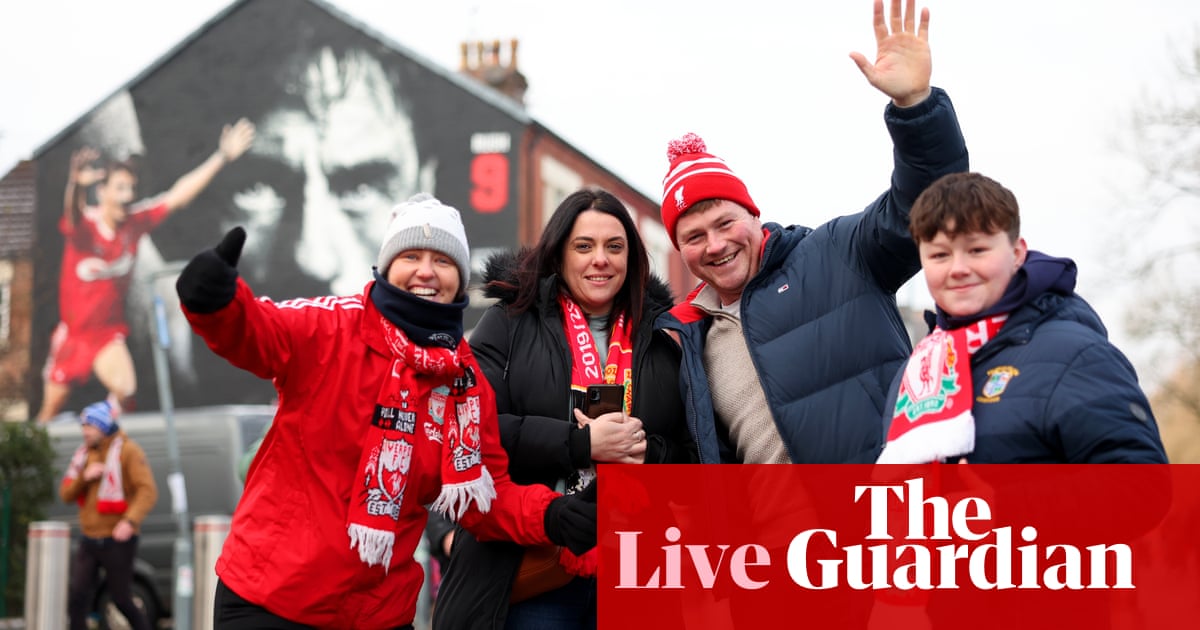‘You should be able to heckle if there’s something sexist on live TV.” In the staff room at the Lloyd Park Children’s Charity in Walthamstow, where he has worked for 30-odd years, Huggy Bear’s guitarist/vocalist Chris Rowley is reflecting on his band’s appearance on a 1993 episode of post-pub Channel 4 show The Word. Their performance of combustible anthem Her Jazz – three minutes of needling feedback, Cro-Magnon riffing and Niki Eliot’s impassioned howl of “You’re old and out of touch!” – was genuinely anarchic on a Friday night “youth” show that typically passed off stage-managed sensationalism as something more radical.
Then, after a segment on glamour models the Barbi Twins, the group and their entourage – now part of the audience – castigated presenter Terry Christian, with one screaming on live TV that Christian believed “all fucking women are shit”. Cue an abrupt ad break, during which the Huggy Nation were roughly escorted from the studio. “It was scary,” Rowley adds. “We hadn’t intended to create this outrage. But the rabble spoke back.”
The incident put them on the cover of Melody Maker the following week, and won this chaotic five-piece instant notoriety. New fans arrived, attracted to their feminist, queer worldview and bruised, cacophonous music, as did violent antagonists who would tell them they were ruining music, and worse. In Killed (of Kids) – a new book compiling fanzines and memorabilia, and retelling their three-year riot of noise and politics in their own words – bassist/singer Eliot defines The Word appearance and its fallout as the moment “being in Huggy Bear stopped being fun”.

And fun had been the whole point, at least at the start. The band – Rowley, Eliot, drummer Karen Hill and guitarists Jo Johnson and Jon Slade – were, Johnson says, “just kids, mucking around with the idea of being a band”, trawling charity shops together and going dancing. “I remember laughter and long evenings walking for miles under London streetlights, chewing each other’s ears off about music, books, films, feminism and art, and feeling similarly ‘different.’”
In bedrooms, playing unamplified guitars, Hill pummelling telephone directories with her drumsticks, Huggy Bear took shape. Their influences included Young Marble Giants, the Slits, the Pop Group and insurgent US underground bands like Nation of Ulysses. “We defined ourselves by what we loved, and also what we hated and despised,” says Rowley. “Our ethics were from left-field feminism, queer politics, situationism. We wanted to carve away all we found terrible and corrupting. We agreed we’d only exist for three years, and then split.”

With that timer ticking, they played their first show at the Jericho Tavern in Oxford, on 20 September 1991, beginning a slew of dates at grimy London and Brighton indie venues alongside “inappropriate bands”. As musicians, Johnson says they were “proudly, defiantly amateurish – though Niki sure could sing. But I saw my limitations in technical ability as liberating. Proficiency can lead to generic music.” And Huggy Bear were anything but generic. “We were fucking amazing,” grins Rowley. “We had this glow. We knew we had something England didn’t have.”
The group were passionate proselytisers for riot grrrl, Olympia, Washington’s feminist-punk movement, discovered via the group Bikini Kill and their fanzine of the same name, which Eliot describes in Killed (of Kids) as “pivotal”. “Discovering riot grrrl was like that bit in The Wizard of Oz when everything turns to Technicolor,” says Rowley, his love for that scene still undimmed. “It was all punk and politics and fanzines.” They plotted their own version for the UK, “to champion underdogs, queer kids, shy kids, kids from difficult backgrounds. We’d only exclude meatheads. We were trying to galvanise, to bring up a gang. We wanted to turn up the brightness.”
They would achieve this via gigs, fanzines and 7in singles. The singles “were like bulletins,” says Rowley. “They were dynamic, putting our message across. We didn’t do polemic – our songs were stories that carried a charge, jet-thrusted by the music, and shock-tactic titles like Katholic Kunt that conjured a striking image.” The music on those singles swung from chaotic punk to interior subterranean-pop to musique concrète, and was “playful, experimental”, says Johnson. “We definitely didn’t fit into binaries and neat boxes that the tabloid music press were interested in.” They’d already won some attention in the music press, including a 1992 profile in Melody Maker accompanied by then-controversial photos of kisses between Rowley and Slade, and Johnson and Eliot. “Everett True” – Melody Maker deputy editor and friend of the band – “told us people were upset by that – staff as much as readers,” says Rowley.
A fortnight after The Word performance, Huggy Bear began their first nationwide tour, accompanied by idols Bikini Kill. New fans flocked to the shows, but so did men who felt provoked by the band’s attempts to create safe spaces at gigs for women. “A man in the audience was sexually assaulting women,” remembers Johnson. “It seemed he had deliberately targeted our gig. We got him kicked out. I went to make to make sure he’d left, and heard the security guard telling him, ‘Sorry mate, there’s a bunch of feminists down the front causing trouble.’ I tried to put the record straight and explain what had been happening, but a girl who was with the bloke started screaming at me. I put my hands up, to say ‘back off’, and the man flew at me, punching my head repeatedly until security finally pulled him away. We reported it to the police but nothing came of the report, but NME wrote it off as ‘Jo Huggy has catfight with girl at show’. I can’t describe how that affected me, and still affects me.”
The tour amplified the craziness. Mainstream media outlets (including the Guardian) descended, and Huggy Bear’s shellshocked reluctance to engage often resulted in adversarial coverage. Major labels attempted to sign the group (“I’d get the little kids I was working with to answer the phone and tell ’em, ‘Chris says he’s not interested’,” grins Rowley). Beastie Boys quoted Her Jazz. After one gig, the group were “held in the dressing room while people outside chanted things and threw stuff at the window”, Rowley says. “However you might thrive on the excitement of winding up the wrong people, the threat of violence seemed real.”
“We had no support, no protection,” adds Johnson. “We were completely exposed.”

That autumn, they took off for their first US tour, “to run away”, Rowley says. “Jon had quit, in part due to his unwillingness to travel. Karen felt we’d become slightly deranged characters.” But, he adds, “America lived up to our expectations – Olympia was the Wizard of Oz-land of our imaginations. We played with amazing bands. We drove up the east and west coasts, drug-soaked, speed-driven, awake for days. Away from the stress at home we felt free, manic. We put that energy into the shows.”
But the damage had been done. And while, by the following year, much of the press-driven mania surrounding the group had subsided, Rowley noticed that at shows “there was no sensationalism, but also no excitement. We were like, ‘Is this what being in a normal band feels like?’” Being in a normal band had never been the point. What’s more, their existential timer was ticking onwards. In 1994, they recorded their sole album, Weaponry Listens to Love, the wild amateurism of yore replaced by something tighter, but bleaker.
“We did it in a dank place in Hackney that was like a bunker,” says Rowley. “These were our end times, and the themes of the record were dark: entrapment, sadness and trying to escape.”
“We’d become more serious, harder, less trusting,” adds Johnson. “And the sound reflects that pretty well.”
Huggy Bear toured Japan in November 1994. Rowley remembers “standing at the back of the room while the girls soundchecked. I was mesmerised, tears in my eyes. Because I knew when we got home, we were breaking up. But there they are, and they’re fire.” They played their final gig on 6 December 1994, at the Laurel Tree in Camden, London.
Rowley says the end was “more a relief than anything else”. In the immediate aftermath he sold all his punk records and, with Eliot and Johnson, immersed himself in jungle music. “We’d all to go to [London club night] Metalheadz with Graham from Blur. We got a bit obsessed. Nothing else compared.” He focused on his work with the Lloyd Park Children’s Charity, which is now fundraising to continue its work, and in 2020 released an album with members of Male Bonding as Adulkt Life, which he says “is exactly the record Huggy Bear would have made next”. Johnson, meanwhile, now makes mesmeric electronic music under her own name.

In the decades since, there have been lucrative offers to reform, each batted away just as the proffered major label deals were. “I’ve said ‘no’ to people my whole life,” Rowley says. “We couldn’t do it and still be us.” The book, meanwhile, only happened because the Los Angeles-based writer, artist and curator Ethan Swan – a diehard Huggy Bear fan since his teens – got in touch and made it happen.
“I’ve not really wanted to revisit it,” admits Johnson, of the Huggy Bear days, admitting that working on the book made her “understand why I’ve found it hard to put my head above the parapet since”. But while she says Huggy Bear “experienced thinly veiled misogyny and homophobia and some dubious journalistic ethics”, reimmersing herself in their history has helped her appreciate what their three-year mission achieved. “Our ‘out of placeness’ drew other misfits, and our shows became welcoming inside spaces for outsiders.” What more could friends bonded by their feeling “similarly different” ask for?

.png) 1 month ago
26
1 month ago
26













































